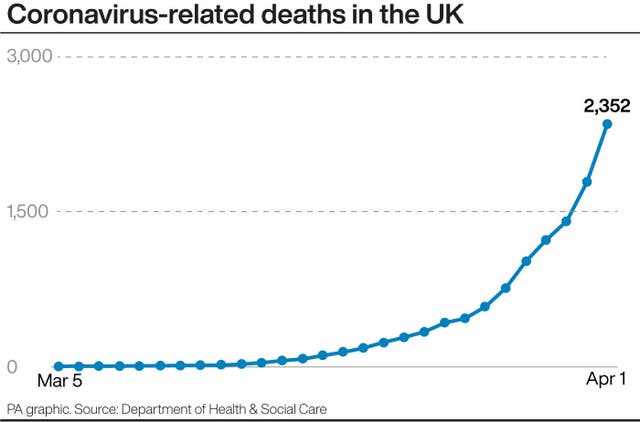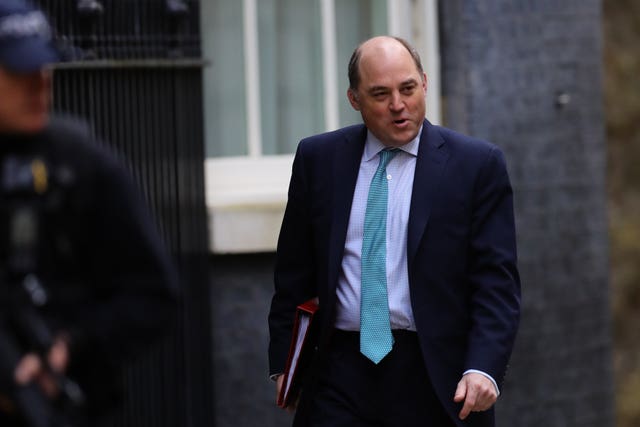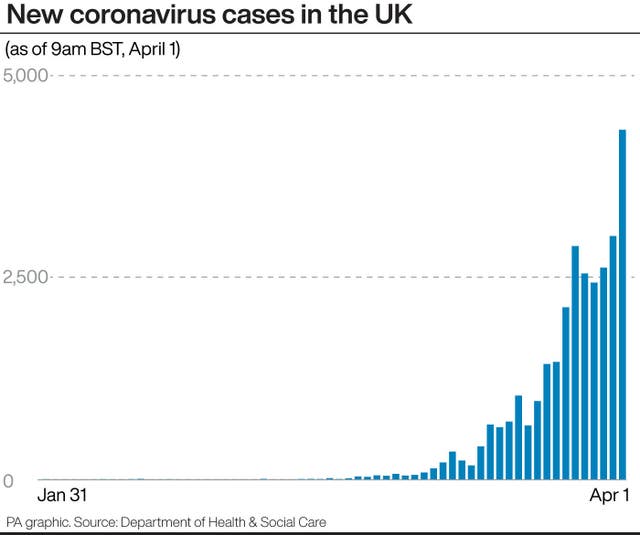
The Government is coming under increasing pressure over Covid-19 testing as the UK experienced its biggest day-on-day rise in deaths so far.
Some 2,352 patients had died in hospital after testing positive for the virus as of 5pm on Tuesday, the Department of Health said, up by 563 from 1,789 the day before.
Prime Minister Boris Johnson said in a video posted on Twitter that it was a “sad, sad day” and that his “thoughts go out to the families of the victims”.
It comes as Downing Street said more than 2,000 NHS staff have been tested for coronavirus as the Government faces intense scrutiny over its policy on testing.
Here's an update to bring you up to speed on some of the things that we are doing to protect our NHS.
We will beat coronavirus together by staying at home, protecting our NHS and saving lives. #StayHomeSaveLives pic.twitter.com/FOYfvzlQPC
— Boris Johnson #StayHomeSaveLives (@BorisJohnson) April 1, 2020
Professor Yvonne Doyle, medical director of Public Health England (PHE), told the Number 10 daily press briefing that 10,000 tests per day were now being carried out and the aim was to get to 25,000 tests by mid-April.
She said the intention was to “get from thousands to hundreds of thousands” of tests for frontline workers in the coming weeks.
PHE has also come under fire over wider testing of members of the public with Covid-19.
It has said repeatedly that most adults who develop symptoms will fully recover and do not need to be tested.
However, many scientists disagree and say it is only through widespread community testing that the UK will be able to track the virus and emerge from lockdown.
Prof Doyle told reporters there was an intention to scale up this sort of testing.
She said: “In terms of mass testing, the testing strategy is to increase the amount of testing done not just in healthcare workers but in the population.
“The rate-limiting step there is not us, it is really whether the tests are valid and then to get that out and about, and aided by technology.
“I think that will change as the phases of this epidemic change. We will perhaps use different techniques.”

Until now, the focus has been on testing patients in hospital to see if they have coronavirus, with NHS trusts told earlier in the week they should use up to 15% of any spare testing capacity for NHS staff.
Health Secretary Matt Hancock has now scrapped that cap, telling NHS hospital labs to use all spare capacity to test their frontline workers.
A letter from NHS England tells trusts to “max out” lab capacity to test staff, adding this “means immediate action please to ‘industrialise’ staff swabbing processes”.
Prof Doyle said there is currently capacity for around 3,000 tests for frontline NHS staff, which will increase.
Asked how many frontline workers are being tested, she said: “The number of tests undertaken in the NHS and Public Health England combined testing capacity is just increasing at the moment.
“So that will be a relatively small number but there is capacity, for example, today for almost 3,000 and that will increase as we get to 25,000, that capacity.
“But the important capacity is in the second strand where we have five centres where people can drive through and get their testing done in order of priority.
“NHS chief executives are identifying that priority and the intention here is to get from thousands to hundreds of thousands within the coming weeks.”
In other developments on Wednesday:
– Defence Secretary Ben Wallace became the fourth Cabinet minister to self-isolate due to Covid-19.
– Key United Nations “Cop26” climate talks which were set to take place in Glasgow in November were postponed until 2021 due to the coronavirus pandemic.
– The World Health Organisation said the number of confirmed Covid-19 cases around the globe will exceed one million in the coming days.
– The family of 13-year-old Ismail Mohamed Abdulwahab, from Brixton, south London, who died after testing positive for coronavirus, appealed to the public to follow social distancing rules in order to protect the NHS and save lives.
– A retired NHS doctor who had continued to work part-time at a hospital died after reportedly contracting coronavirus.
– The All England Club announced Wimbledon would not be staged this year for the first time since World War Two.
– A string of summer festivals in Edinburgh, including the International Festival, Festival Fringe, Art Festival, International Book Festival, and The Royal Edinburgh Military Tattoo, were cancelled for the first time in more than 70 years following concerns over the coronavirus pandemic.

The Government has blamed a global lack of reagents needed to carry out tests, though the chemical industry in the UK suggested there were no shortages.
NHS staff have expressed frustration that they are being forced to self-isolate just as they are most needed, because tests are not available to show whether they are clear of the disease.
Labour’s shadow health secretary Jonathan Ashworth also called for an explanation on why the UK’s Covid-19 testing is lagging behind other countries.
Speaking to the PA news agency, he said: “Germany are testing half a million people a week, yet we still haven’t hit the 10,000 a day the Prime Minister promised.
“NHS staff are rightly asking if we’ve left it too late to buy the kits and chemicals we need, or whether our lab capacity is too overstretched after years of tight budgets.”
However, some scientists have said ramping up testing in the UK will be difficult.

Stephen Baker, professor of molecular microbiology at the University of Cambridge, said: “There are multiple issues with setting up new diagnostic testing capacity outside of regular diagnostic laboratories.
“This is not an overnight solution. Research laboratories have different approaches, equipment and staff.”
He said multiple steps were required to ensure tests are done properly and results are correctly validated, adding : “There is nothing more dangerous at the moment than reporting incorrect negative or positive results to staff or patients.”
Chris Hopson, the chief executive of NHS Providers, which represents NHS trusts, said maximum testing capacity in the UK was currently “very constrained” at around 13,000 tests per day.
He said on Twitter that if existing NHS pathology labs “had unlimited swabs and reagent, there would be enough test machine capacity to process around 100,000 tests a day”.
He said a small sample of tests from NHS staff over the weekend showed only 15% were positive for coronavirus, and 85% could go back to work.
Lots on staff testing this morning. Here's the perspective of trust leaders in one of my threads. https://t.co/udUnOcqHhx
— Chris Hopson (@ChrisCEOHopson) April 1, 2020
But he added: “Before getting carried away, remember testing capacity is still v constrained (currently 13k/day) and there are 1.2 million NHS staff. So no immediate prospect of mass staff testing.”
Earlier, Housing and Communities Secretary Robert Jenrick denied the Government and PHE would only agree to centralised testing after claims from scientists and universities that their offers of help have been rejected.
He said the Government was willing to “work with any provider” who had the “right infrastructure and skills” and urged them to get in touch.


Comments: Our rules
We want our comments to be a lively and valuable part of our community - a place where readers can debate and engage with the most important local issues. The ability to comment on our stories is a privilege, not a right, however, and that privilege may be withdrawn if it is abused or misused.
Please report any comments that break our rules.
Read the rules hereLast Updated:
Report this comment Cancel